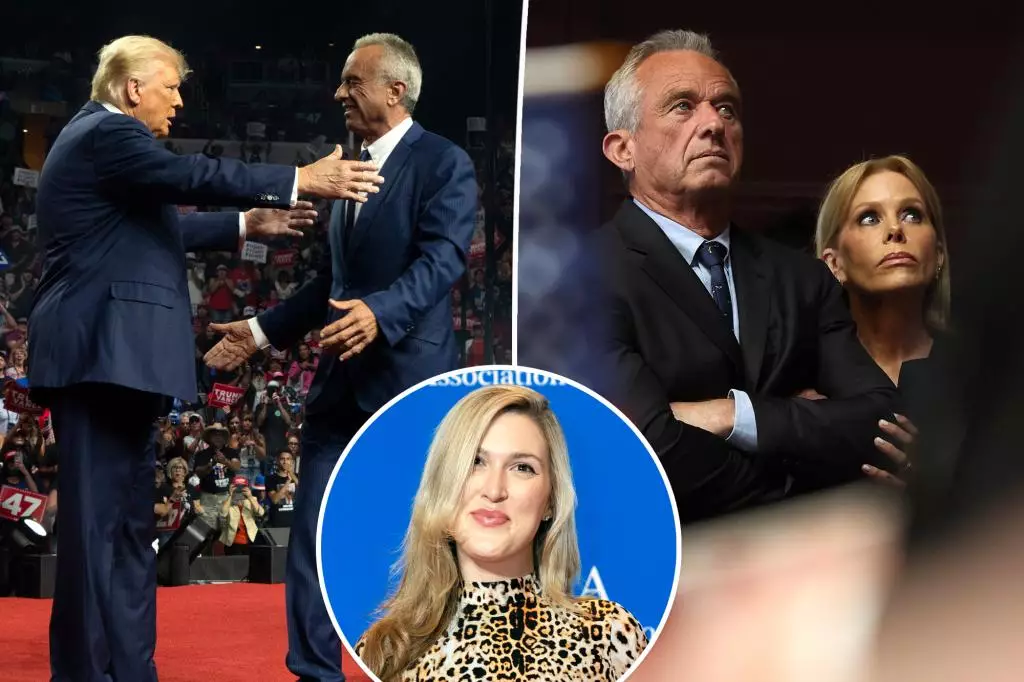The intertwining of personal lives and political ambitions often creates captivating narratives in modern politics. Recently, Robert F. Kennedy Jr.—the latest controversial figure from the iconic Kennedy lineage—has found himself in the eye of a media storm following allegations of infidelity and an alleged romantic involvement with New York Magazine’s Olivia Nuzzi. What does this mean for Kennedy’s prospects in a potential Trump administration? As the dynamics of public perception shift, it raises several intriguing questions about the resilience of political careers amidst personal scandals.
In the aftermath of the revelations regarding Kennedy’s digital romance with Nuzzi, three other women surfaced, claiming to have had romantic relationships with him as well. These allegations paint a picture of a man in turbulent personal waters, confronting the ghosts of past flings while navigating a complex political landscape. Strikingly, within political circles in Washington, these scandals appear to hold little weight. Sources close to Trump’s inner circle have reportedly expressed that the unfolding drama surrounding Kennedy is unlikely to impede his political aspirations should Trump secure another term.
The notion that this conduct might serve to elevate Kennedy’s status rather than detract from it speaks volumes about the evolving standards in the contemporary political arena. An unnamed political insider asserted that in Washington, “this is barely a scandal”—a sentiment that rings true for many contemporary politicians who have weathered storms of personal controversy. Rather than suffer significant repercussions, it seems that Kennedy’s infamous reputation may be embraced as part of a new political paradigm that prioritizes charisma and loyalty over personal blemishes.
The indifference expressed by GOP insiders showcases a shift within political calculations. As one source noted, Trump is primarily focused on electoral success rather than maintaining a moral high ground within his potential cabinet. This perspective presents an increasingly pragmatic approach to politics where allegiances and competencies are valued more than personal moralities. Moreover, the idea that “we are not the party of George W. Bush anymore,” underscores not only a transformation in political ethos but also an expectation of operational flexibility among emerging political figures.
Even as concerns about Kennedy’s alleged extramarital affairs rise—and suggestions of blackmail due to his relationships emerge—Trump’s administration seems more inclined to make accommodations for him. This highlights an unsettling trend in which personal behaviors that historically might have signaled the end of a political career are now largely overlooked.
Media scrutiny has intensified as details of Kennedy’s life come to light. The airing of his alleged affairs, particularly with a younger reporter, raises important questions not just about his character but also about the ethical implications within political journalism. How does a reporter maintain objectivity while entangled in romantic interactions with a subject of their coverage? This conflict of interest could reshape perceptions of integrity in journalism and raise red flags for future political reporting.
Additionally, the internal investigation at New York Magazine into Nuzzi’s alleged relationship with Kennedy further complicates the narrative. This situation reflects a growing realization within media organizations about the need to maintain ethical standards amidst increasingly competitive environments. As the line blurs between personal and professional realms, the consequences for both parties involved become harder to delineate.
Implications for Kennedy’s Marriage and Public Image
Robert F. Kennedy Jr.’s personal life is under a microscope, especially with his wife, actress Cheryl Hines, reportedly furious over both his alleged infidelities and his endorsement of Trump. The implications for their marriage are substantial; sources indicate that Hines is contemplating the viability of their relationship against the backdrop of these scandals. Past patterns within the Kennedy family of political figures facing infidelity resonate throughout this dynamic, perpetuating a longstanding narrative that intertwines personal missteps with public perception.
Kennedy’s history of philandering reveals a complex character navigating personal demons amid public scrutiny. Diaries from his late wife suggest he kept detailed accounts of his past romantic escapades, indicating that these patterns are not new but rather deeply entrenched in his identity. And if the specter of potential additional revelations looms large, they could further tarnish both his personal and public images.
The evolving landscape of political scandals in the U.S. has rendered traditional notions of morality and accountability increasingly fluid. As Robert F. Kennedy Jr. grapples with personal allegations while eyeing potential political futures, the resilience displayed by such figures signals a broader cultural shift in how the electorate views character, infidelity, and professional aptitude.
Political resilience amid personal controversy is a growing phenomenon; as the political landscape transforms, so too must our understanding of what constitutes a scandal. Whether Kennedy’s narrative ends in triumph or turmoil remains to be seen, but his experience serves as a powerful reminder of the dramatic intersections of personal lives and public careers.

